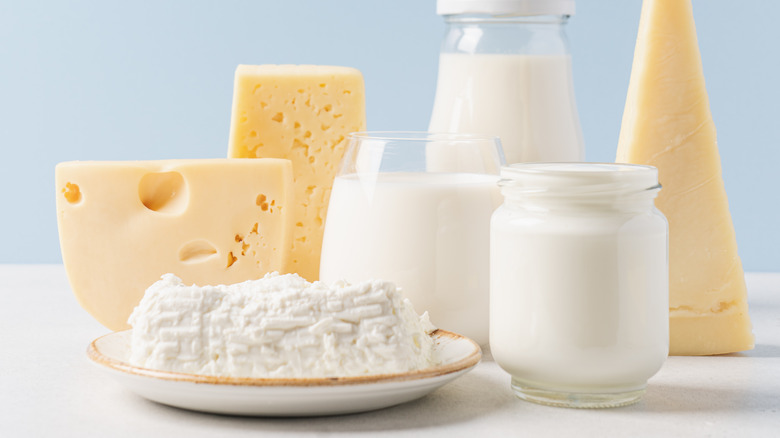This Hydrating Beverage Can Lower High Blood Pressure (And It's Not Water)
More than 120 million people in the United States — 47% of the population — have high blood pressure, according to a 2023 report in Circulation. High blood pressure occurs when the blood circulating in your arteries exerts too much force, which can stress the heart. Untreated hypertension can result in heart attack or stroke. Your risk of high blood pressure increases as you get older, but stress, obesity, smoking, your family history, smoking, and lack of exercise will also factor into this risk (via the Mayo Clinic).
Your diet can also play a role in developing high blood pressure, particularly if it has too much salt and not enough potassium. That's why the American Heart Association suggests adding more potassium to your diet if you have high blood pressure. Potassium keeps your sodium levels in balance and relieves some of the pressure of the blood on your arteries. The AHA recommends 3,400 milligrams of daily potassium for men and 2,600 milligrams for women. Rather than taking a potassium supplement, you can consume potassium-rich foods such as bananas, sweet potatoes, and fish. Although fruit juices also have potassium, milk and other dairy foods can help reduce your blood pressure.
Milk has nutrients that can reduce blood pressure
Although milk is known for its calcium, it also has other electrolytes such as potassium and magnesium to regulate blood pressure (via the University of Utah). One cup of low-fat milk has 391 milligrams of potassium and 30 milligrams of magnesium.
Milk might have other ingredients that can lower your blood pressure, per a 2016 article in the British Journal of Clinical Pharmacology. Your body has ACE enzymes that can raise blood pressure by narrowing your blood vessels. Doctors often prescribe ACE inhibitors to help manage high blood pressure. Milk has proteins that work like ACE inhibitors that can help people with high blood pressure, but they don't cause low blood pressure in people whose blood pressure is normal.
It's not that drinking milk every day can make huge changes in your blood pressure in less than a year, according to a 2017 review in BMJ. Drinking milk can cause slight changes in blood pressure, but it alone can't prevent high blood pressure.
Dairy products might reduce your risk of hypertension
A 2015 article in the British Journal of Nutrition tracked the diets of more than 2,600 people over several years to see who developed high blood pressure. People who ate more dairy, especially low-fat and fat-free dairy, had smaller increases in their blood pressure over time. A daily serving of yogurt reduced the risk of developing high blood pressure by 6%.
Even though full-fat dairy products are rich in saturated fat, a 2019 article in Advances in Nutrition suggests looking at the whole nutritional profile of dairy foods rather than focusing on saturated fat. In other words, full-fat dairy products don't have the same effects on blood pressure, insulin sensitivity, and cholesterol as was previously assumed.
In fact, two servings a day of whole-fat dairy might lower your risk of developing metabolic syndrome, according to a 2020 study in BMJ Open Diabetes Research & Care. Low-fat dairy didn't make much of a difference. The study also found that the more people consumed total dairy, the lower the incidence of hypertension and diabetes.



